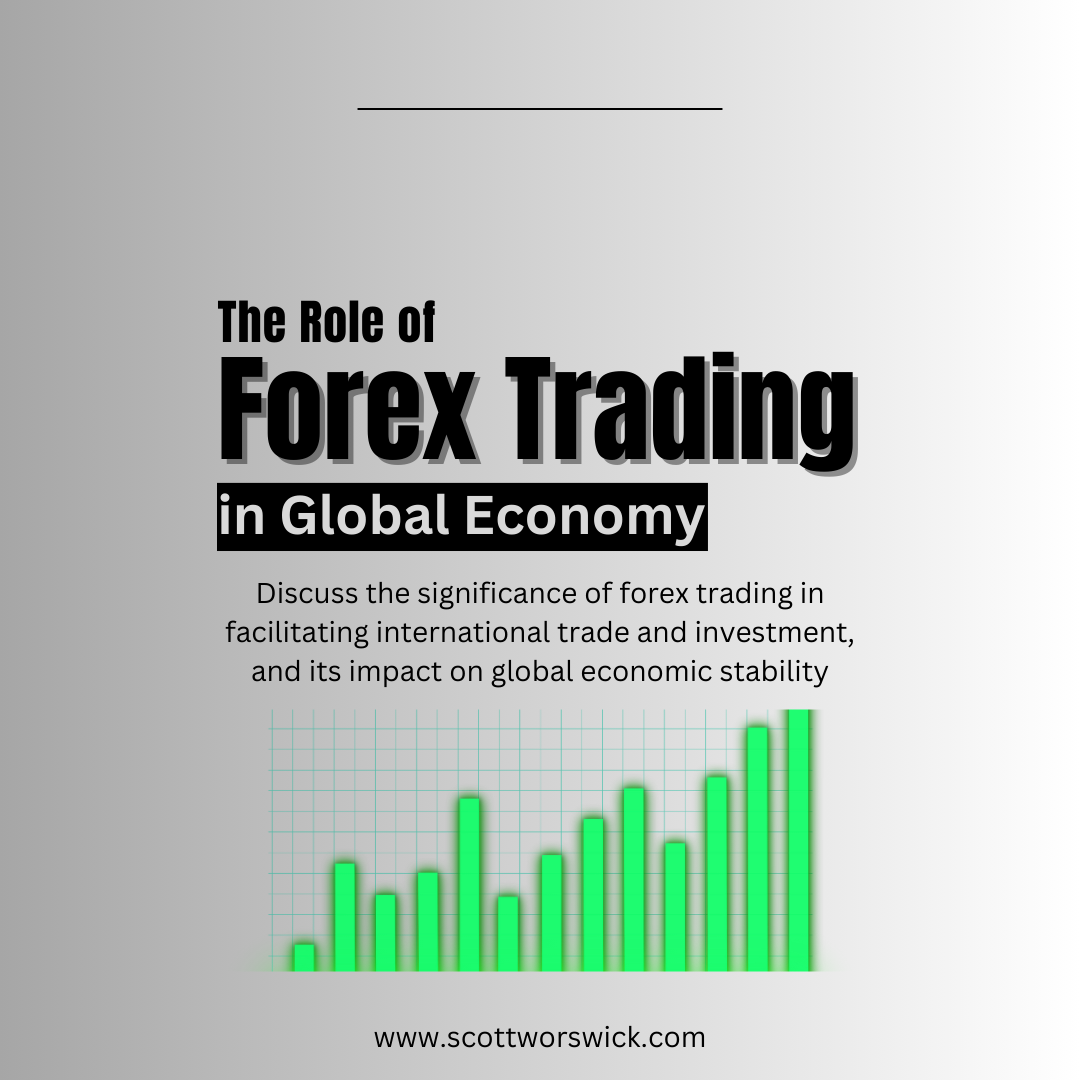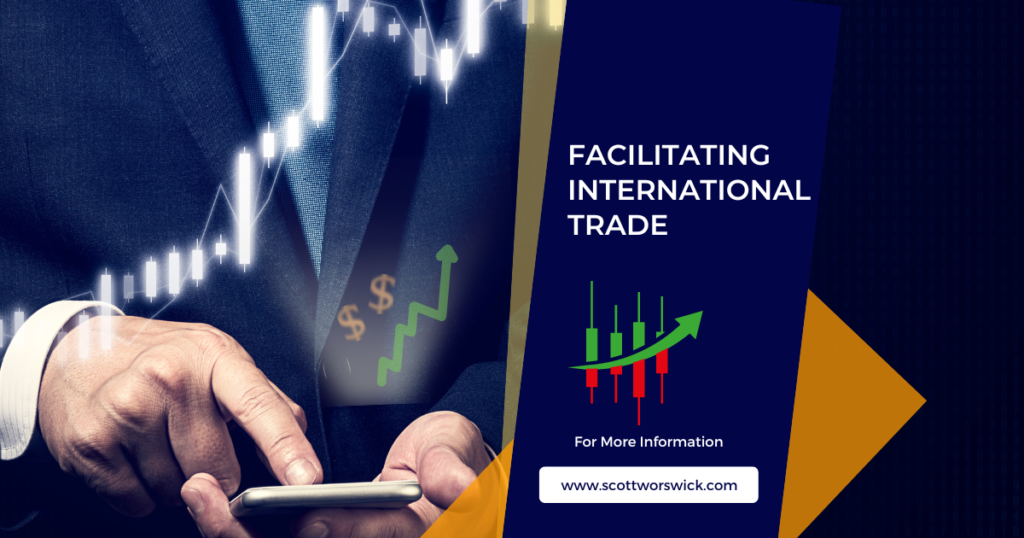The global economy operates within a complex framework of interconnectedness, where the exchange of currencies lies at the core of international transactions. At the heart of this intricate system stands forex trading, a fundamental mechanism that facilitates the exchange of currencies between nations, businesses, and individuals. Forex trading serves as the linchpin of international trade, providing the essential infrastructure for the seamless flow of goods and services across borders. By enabling the conversion of one currency into another, forex trading ensures that businesses can engage in cross-border transactions efficiently, fostering economic cooperation and growth on a global scale.
Moreover, beyond its role in facilitating trade, forex trading plays a pivotal role in empowering international investment and diversification. Investors seeking to expand their portfolios beyond domestic markets rely on the forex market to buy and sell currencies, invest in foreign assets, and implement risk management strategies. The flexibility and liquidity of the forex market enable investors to navigate global markets with ease, capitalizing on emerging opportunities while mitigating risks associated with currency fluctuations. Thus, forex trading serves as a gateway for investors to access global markets, contributing to the efficient allocation of capital and the promotion of economic prosperity worldwide.
Furthermore, the impact of forex trading extends beyond facilitating transactions and investment; it exerts a significant influence on global economic stability. Exchange rates, determined by supply and demand dynamics in the forex market, reflect a country’s economic health and market sentiment. Central banks and policymakers closely monitor forex markets to manage exchange rate volatility and implement monetary policies aimed at promoting stability. As such, forex trading plays a crucial role in stabilizing economies, mitigating the adverse effects of economic shocks, and fostering confidence in the global financial system.
Table of Contents
Facilitating International Trade:
The forex market serves as the cornerstone for facilitating international trade, providing the essential infrastructure for the exchange of currencies necessary for cross-border transactions. In the realm of global commerce, businesses engage in transactions with partners located in different countries, each using their own currencies. This necessitates the conversion of one currency into another, a process seamlessly facilitated by forex trading. Whether it’s a multinational corporation purchasing raw materials from overseas or a small business exporting goods to international markets, forex trading ensures that transactions can be conducted efficiently, allowing goods and services to flow smoothly across borders.
Moreover, forex trading plays a crucial role in managing currency risk, thereby enabling businesses to engage in international trade with confidence. Fluctuations in exchange rates can significantly impact the profitability of cross-border transactions, exposing businesses to currency-related risks. Through forex trading, businesses can hedge against these risks by locking in exchange rates through forward contracts or other derivative instruments. This ability to manage currency risk empowers businesses to explore new markets, expand their customer base, and enhance their competitiveness on the global stage, ultimately fostering economic growth and prosperity.
Furthermore, the efficiency and liquidity of the forex market contribute to the reduction of transaction costs associated with international trade. Unlike traditional currency exchange methods, which may involve intermediaries and incur additional fees, forex trading allows for direct currency conversion between parties at competitive market rates. This not only lowers transaction costs for businesses but also facilitates faster settlement times, reducing the time and paperwork involved in cross-border transactions. As a result, forex trading plays a crucial role in improving the efficiency of international trade, making it more accessible and cost-effective for businesses of all sizes to participate in global markets and contribute to economic development.
Empowering International Investment:
Forex trading serves as a catalyst for international investment, providing investors with the tools and opportunities to diversify their portfolios across global markets. In today’s interconnected world, investors seek to capitalize on diverse investment opportunities beyond their domestic borders. Forex trading enables investors to buy and sell currencies, invest in foreign assets such as stocks and bonds, and engage in currency hedging strategies to mitigate risks associated with currency fluctuations. This access to international markets empowers investors to optimize their portfolios, enhance returns, and spread risk across different economies and asset classes, contributing to the overall efficiency and stability of the global economy.
Furthermore, forex trading facilitates the seamless flow of capital across borders, promoting investment and economic development in both developed and emerging markets. By providing a liquid and accessible marketplace for currency exchange, forex trading facilitates capital formation and allocation, enabling investors to deploy capital where it is most needed and where it can generate the highest returns. This influx of foreign investment fuels economic growth, stimulates job creation, and fosters innovation, thereby driving prosperity and raising living standards in countries around the world. Thus, forex trading plays a pivotal role in mobilizing resources and channeling investment to areas with the greatest potential for growth and development.
Moreover, the transparency and efficiency of the forex market enhance investor confidence and foster a conducive environment for international investment. Unlike some other financial markets, the forex market operates 24 hours a day, five days a week, providing continuous access to real-time pricing information and liquidity. This transparency allows investors to make informed decisions based on market fundamentals and economic data, minimizing uncertainty and reducing the risk of market manipulation. Additionally, the high liquidity of the forex market ensures that investors can enter and exit positions with ease, promoting market efficiency and price discovery. As a result, forex trading empowers investors to navigate global markets with confidence, contributing to the stability and resilience of the global economy.
Maintaining Economic Stability:
Exchange rates, influenced by forex trading, play a pivotal role in maintaining global economic stability by reflecting the relative strength of economies and signaling underlying economic health. Fluctuations in exchange rates can have profound implications for international trade, investment flows, and overall economic activity. Central banks and monetary authorities closely monitor forex markets to manage exchange rate volatility and implement monetary policies aimed at promoting stability. Through interventions such as interest rate adjustments, open market operations, and currency interventions, central banks seek to influence exchange rates and ensure macroeconomic stability. By actively managing exchange rate dynamics, policymakers aim to support economic growth, control inflation, and maintain financial stability, thus underscoring the critical role of forex trading in preserving global economic equilibrium.
Moreover, the forex market serves as a key mechanism for transmitting economic signals and information across borders, fostering transparency and efficiency in the global financial system. Price movements in currency pairs reflect market participants’ perceptions of economic data, policy decisions, and geopolitical events. These movements provide valuable insights into global economic trends and developments, guiding decision-making for businesses, investors, and policymakers alike. By facilitating the rapid dissemination of information and enabling market participants to react swiftly to changing economic conditions, forex trading enhances market efficiency and promotes stability in the global economy.
Furthermore, the flexibility and liquidity of the forex market enable market participants to adjust to changing economic conditions and mitigate the impact of external shocks. In times of economic uncertainty or geopolitical instability, investors may seek refuge in safe-haven currencies such as the US dollar, Japanese yen, or Swiss franc, driving demand for these currencies and influencing exchange rates. The ability to quickly buy or sell currencies in response to changing market conditions allows investors to manage risks effectively and preserve capital. Additionally, the deep liquidity of the forex market ensures that transactions can be executed efficiently without significantly impacting exchange rates, contributing to market stability and resilience.
Overall, forex trading plays a crucial role in maintaining global economic stability by providing a platform for managing exchange rate volatility, transmitting economic signals, and enabling market participants to adapt to changing economic conditions. By influencing exchange rates and capital flows, forex trading influences trade, investment, and financial market dynamics, shaping economic outcomes on a global scale. As such, a well-functioning and efficient forex market is essential for promoting stability, resilience, and prosperity in the global economy.
Transmitting Economic Signals:

The forex market serves as a vital conduit for transmitting economic signals and information across borders, providing valuable insights into global economic trends and developments. Price movements in currency pairs reflect market participants’ perceptions of economic data, policy decisions, and geopolitical events, effectively communicating the underlying fundamentals of economies worldwide. For instance, an increase in interest rates by a central bank may lead to appreciation in the currency as investors seek higher returns, signaling confidence in the economy’s strength. Conversely, negative economic news or geopolitical tensions can trigger currency depreciation as investors move towards safer assets, thereby conveying concerns about economic stability. In this way, forex trading acts as a real-time barometer of economic conditions, helping investors, businesses, and policymakers make informed decisions in response to changing economic landscapes.
Moreover, the transparency and efficiency of the forex market facilitate the rapid dissemination of economic information, enabling market participants to react swiftly to changing conditions. Unlike some other financial markets, the forex market operates 24 hours a day, five days a week, providing continuous access to real-time pricing information and liquidity. This accessibility allows investors to monitor economic developments as they unfold and adjust their trading strategies accordingly. Whether it’s a significant economic release, a central bank announcement, or a geopolitical event, forex traders are quick to incorporate new information into their trading decisions, contributing to market efficiency and price discovery.
Furthermore, the interconnectedness of global financial markets means that developments in one part of the world can have ripple effects across currencies and asset classes. Changes in exchange rates driven by forex trading can impact trade flows, inflation rates, and monetary policy decisions, influencing economic outcomes both domestically and internationally. For instance, a depreciation in the currency of an exporting nation may boost export competitiveness, leading to increased economic activity and potentially affecting trade balances and growth prospects in trading partner countries. By transmitting economic signals across borders, forex trading fosters greater transparency and coordination in the global economy, facilitating smoother adjustment to changing economic conditions.
In conclusion, forex trading plays a crucial role in transmitting economic signals and information across borders, providing valuable insights into global economic trends and developments. By reflecting market participants’ perceptions of economic fundamentals, policy decisions, and geopolitical events, forex markets help investors, businesses, and policymakers make informed decisions in response to changing economic landscapes. The transparency, efficiency, and interconnectedness of the forex market contribute to market efficiency, price discovery, and economic stability, underscoring the significance of forex trading in shaping economic outcomes on a global scale.
Navigating Global Uncertainties by Forex Trading:
In an increasingly interconnected world, forex trading plays a crucial role in navigating global uncertainties and risks that can disrupt financial markets and impact economic stability. Geopolitical tensions, trade disputes, and economic crises are among the myriad factors that can trigger volatility in currency markets, affecting exchange rates and investor sentiment. Forex traders are tasked with analyzing these geopolitical and economic developments to anticipate their potential impact on currency values and adjust their trading strategies accordingly. By staying informed and adaptable, forex traders can effectively navigate global uncertainties and mitigate the associated risks, contributing to market stability and resilience.
Furthermore, the flexibility and liquidity of the forex market enable market participants to respond quickly to changing economic conditions and geopolitical events. Unlike some other financial markets, the forex market operates 24 hours a day, five days a week, providing continuous access to liquidity and real-time pricing information. This accessibility allows traders to react swiftly to breaking news and geopolitical developments that may impact currency values. Whether it’s a sudden shift in government policies, geopolitical tensions, or unexpected economic data releases, forex traders can adjust their positions in response to new information, helping to stabilize currency markets amid uncertainty.
Moreover, forex trading strategies and risk management techniques play a crucial role in helping traders navigate global uncertainties while preserving capital. Risk management practices such as setting stop-loss orders, implementing position sizing strategies, and diversifying portfolios help traders limit potential losses and protect against adverse market movements. Additionally, hedging strategies such as forward contracts and options allow businesses and investors to mitigate currency risk associated with international trade and investment, providing a layer of protection against unforeseen events. By employing these risk management techniques, forex traders can navigate volatile market conditions with confidence, contributing to overall market stability.
In conclusion, forex trading serves as a vital mechanism for navigating global uncertainties and mitigating risks that can disrupt financial markets and impact economic stability. By providing liquidity, flexibility, and real-time pricing information, the forex market enables traders to react swiftly to changing geopolitical and economic conditions. Furthermore, risk management practices and hedging strategies help traders limit potential losses and protect against adverse market movements. In this way, forex trading plays a critical role in stabilizing currency markets and promoting resilience in the face of global uncertainties, ultimately contributing to the stability and efficiency of the global economy.
Conclusion:
In conclusion, forex trading stands as a cornerstone of the global economy, facilitating international trade and investment while exerting a significant impact on global economic stability. The seamless exchange of currencies enabled by forex trading ensures the smooth flow of goods and services across borders, fostering economic cooperation and growth on a global scale. Moreover, forex trading empowers investors to participate in global markets, diversify their portfolios, and manage risks associated with currency fluctuations, thereby contributing to the efficiency and resilience of the global economy.
Furthermore, forex trading plays a crucial role in maintaining global economic stability by influencing exchange rates, transmitting economic signals, and enabling market participants to navigate uncertainties. Central banks and policymakers closely monitor forex markets to manage exchange rate volatility and implement monetary policies aimed at promoting stability. By providing transparency, liquidity, and efficiency, the forex market fosters greater coordination and resilience in the face of economic shocks and geopolitical tensions, contributing to overall market stability and confidence.
In the ever-evolving landscape of the global economy, the role of forex trading in facilitating international trade and investment will continue to be indispensable. As nations become increasingly interconnected and reliant on cross-border transactions, the efficiency and stability of the forex market will remain essential for promoting economic growth, prosperity, and stability worldwide. Understanding the significance of forex trading is crucial for businesses, investors, and policymakers as they navigate the complexities of the global economic landscape and work towards building a more resilient and prosperous future.






Pingback: Top 10 Ways that Make You Successful in Forex Trading -